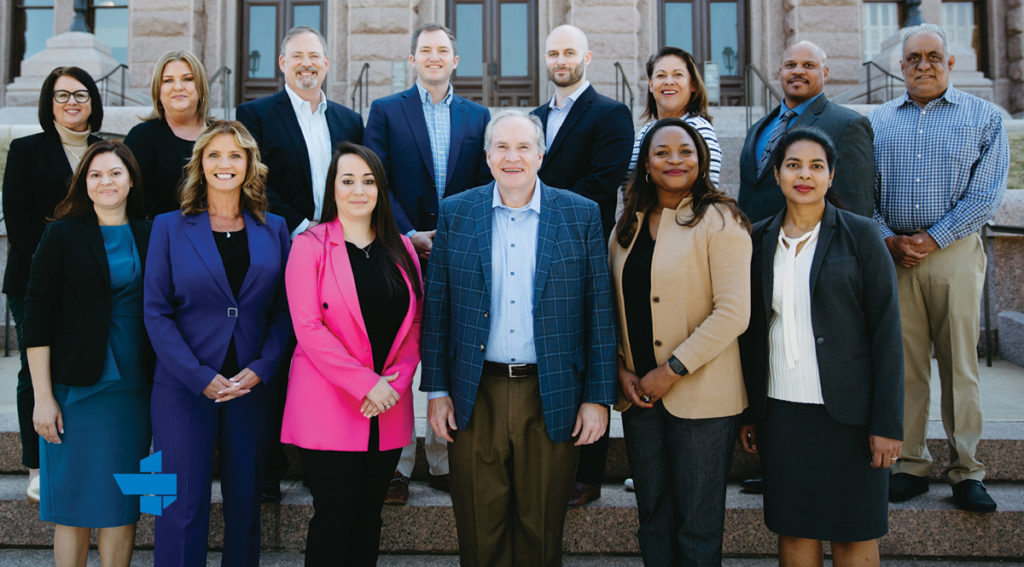Education is the foundation on which we base our perspective of the world, and our depth of knowledge in a certain area often determines where we choose to apply that knowledge and skill. From veterinarians and dentists to engineers and architects, success often hinges on dedication to furthering education. That is why continuing education is paramount to long-term progress in any industry.

Educating Health Care Leaders
In health care specifically, there are frequent advances in science and medicine, and public health challenges continue to arise. Health care workers are constantly striving to progress the way they care for patients, and how they tackle such a monumental project is often in the hands of hospital leaders.
There’s no industry more turbulent and tightly regulated than health care.
We’ve seen this at an extreme, global level as the COVID-19 pandemic made the world stop and put hospitals under a microscope. The health care industry scrambled to reassess its public health strategies and redefine some of its standards to accommodate for the threat of COVID-19. Even now, health care leaders are still trying to adapt their practices based on lessons learned during the pandemic while still accounting for the potential for further COVID-19 surges.
Having hospital leaders who understand the changes occurring not only in health care, but at the policy level and in other industries, and the potential implications of those changes on their organization, is critical to minimizing the impact of those external factors. Leaders in any industry, particularly in health care, should be proactive in pursuing opportunities to further their knowledge to set their organization up for success.
THA’s Leadership Fellows Program
For the Texas Hospital Association, one of its core competencies is producing educational products and programs that assist its members with marketplace challenges. In addition to various conferences, resources and hybrid educational events, THA provides hospital and health system leaders the opportunity to further their knowledge in the policy landscape through its Leadership Fellows Program.
Taking place over one calendar year, THA’s Leadership Fellows Program is the association’s premier leadership development cohort. THA created the program to provide health care leaders with in-depth knowledge of the legislative and regulatory process, introduce key policy issues and connect them with key policy decision-makers in Texas.

“The Leadership Fellows Program is a great opportunity to find health care leaders in their communities and give them the preparation and deep-dive knowledge of policy and the regulatory environment to become a better advocate for health care policy before their legislative delegation and within their communities.”
JOHN HAWKINS, CEO/PRESIDENT
OF THE TEXAS HOSPITAL ASSOCIATION
The THA Leadership Fellows Program, created in 2014, includes lectures, panels, facilitated discussions, project development and competition as well as a mentoring component. The program aims to help its participants grow as leaders and become fully equipped to lead policy discussions, drive integration and create environments that enable the best possible patient care outcomes for their hospitals or health systems.

“The curriculum was designed to really immerse and familiarize health care administrators with the legislative and regulatory process that they participate in as leaders of their hospitals and learn what key policy issues are, how to engage with legislators at the state and federal levels and provide them with tools they can take back to their hospitals to use within their organization’s communities or at the state and federal levels,” said Lindsay Thompson, senior director, education and governance programs, at THA, who spearheads the program.
The cohort meets in Austin four times over the year for program modules. Each module consists of key policy core competencies, real-time legislative updates, communications and presentation strategies, leadership and engagement, and CEO Insights. One module and a highlight of the program includes a visit to and tour of the Texas State Capitol building.
At the conclusion of the program, the cohort has the necessary tools to be effective health care advocates at the community, state and federal levels. The cohort also joins the growing alumni network of over 150 health care executives that provides long-term connections and resources for fellows as they continue in their careers in health care.
Thompson explained that throughout the program, THA fellows engage with a diverse group of health care experts and participate in a curriculum that sparks open dialogue and debate. Fellows work with THA’s advocacy staff to become familiar with the issues each lobbyist works on so they can engage with them on issues their organizations face. Fellows are also exposed to legislators or legislative staffers, resources at state agencies like HHSC or DSHS as well as established hospital CEOs from across the state.


The networking and mentorship component of the program seems to be one of the biggest draws for applicants looking to diversify their network and expand camaraderie with colleagues across the state.

“My corporate office connected me with some of our THA lobbyists in Austin and we started talking about the IMD Exclusion and things we’d love to get passed to make sure that we broaden access to behavioral health services,” said Marie Alvarez, Group CEO, Acadia Healthcare.
“Being able to get in the door to make things happen for people who are in need is important to me.”
Since its genesis, THA’s Leadership Fellows Program has evolved its cohorts and curriculums to meet the needs of THA hospital and health system members and the changing tides of the health care in Texas and in the U.S.
“The program’s membership has become increasingly diverse,” said Jennifer Banda, J.D., senior vice president, advocacy and public policy, for THA.

“It’s always been diverse in terms of gender, ethnicity, background and geography, but in terms of types of health care leaders, we’ve focused on making sure there’s someone representing every perspective in the room, whether it’s physician leaders, behavioral health leaders, nurse leaders, or risk management leaders.”
The program also aims to ensure diverse representation of urban and rural hospitals. More rural hospitals have closed in Texas — 26 since 2010 — than in any other state. THA continues to focus on making the Leadership Fellows program accessible to leaders within rural hospitals.
Adapting to the Policy Environment
With its mission to educate hospital leaders in the legislative and regulatory process, the THA Leadership Fellows Program is constantly evolving its curriculum to make sense in the current political and health care landscape.
Each year the cohort’s capstone program focuses on a key issue facing the health care industry. In the past this has included Medicaid expansion, behavioral health access and the impacts of COVID-19 on Texas hospitals. This year’s group is focused on how to address the workforce pipeline, which parallels the work of THA’s workforce task force and reflects THA’s policy priorities for the 2023 legislative session.
“We always intend to structure the capstone to align with THA’s key policy priorities for any given year so that while fellows are working on their projects, whether they are actually presenting to a legislator at the Capitol or not, they have THA’s step-by-step advocacy and communications strategy to reference,” Thompson said.
Banda added, “It’s also beneficial for THA as we’re hearing directly from our members on what they’re seeing in their hospitals and what they’re finding in their research which helps inform our staff so we can better advocate on behalf of our member hospitals and health systems.”
Along with the program’s ever-changing curriculum, Thompson shared that the program itself has evolved over time. Originally including some professional development programming on leadership and communications skills, one change that has been made is the program’s added focus on developing strong communications and presentations skills. This curriculum change was made after multiple cohorts expressed interest in sharpening some key foundational leadership skills like public speaking and formal presentation delivery.
Thompson added that THA hopes to continue evolving the program and the curriculum to meet the needs of hospital and health system executives and provide them with the resources and tools they need to better their organizations.
Leadership and professional development programs like THA’s Leadership Fellows Program are becoming increasingly popular, especially in the health care industry as the last two years have proven to be a challenge for many executives and leaders and many are seeking strategic guidance in the uncharted post-pandemic environment. Texas hospitals and health systems will always need and be in demand of experienced and informed leaders so ensuring there are educational opportunities in place for these individuals to further their knowledge is vital to a sustainable future in health care.
The application period for the 2023 THA Leadership Fellows program is open. Learn more by visiting www.tha.org/fellows.

“The THA Leadership Fellows Program was a remarkable experience, connecting me with a diverse group of health care peers from across the state. Our program days brought speakers that opened us up to new ideas and encouraged a rich discussion on health care as we saw it, and the potential to improve how we delivered health care. As I look back at the program, it was a significant milestone in my career development, and I still enjoy the friendships I made during the THA Leadership Fellows Program.”
Tim Ottinger » Class of 2014
Division Director of Government Relations
CHI St. Luke’s Health

“The THA Leadership Fellows Program prepared me to become a better leader in health care. It broadened my understanding of policy, introduced me to some wonderful leaders in our industry and made me more aware of the industry expertise available to THA member hospitals. Getting to spend time with people from various backgrounds I highly recommend participation in the THA Leadership Fellows Program as a great opportunity to strengthen ourself as a leader and strengthen your organization.”
Paul Aslin » Class of 2019
Interim CEO/Chief Operations Officer
OmniPoint Health Hospital

“The THA Leadership Fellows Program was an amazing opportunity to gain a deep knowledge and insight into the multitude of policy issues and legislative priorities that impact our work every day. Throughout the program, we were equipped with tools and resources that increased our effectiveness as health care leaders in discussing and influencing these very topics. Additionally, the quality and diversity of fellow participants helped to expand our perspectives and understand the implications of public policy across the state. The network and dialogue that began with my fellow classmates on day one has been ongoing and invaluable, and collectively has helped us be better advocates for the needs of our health care communities.”
AJITH PAI » Class of 2019
President
Texas Health Harris Methodist Hospital

